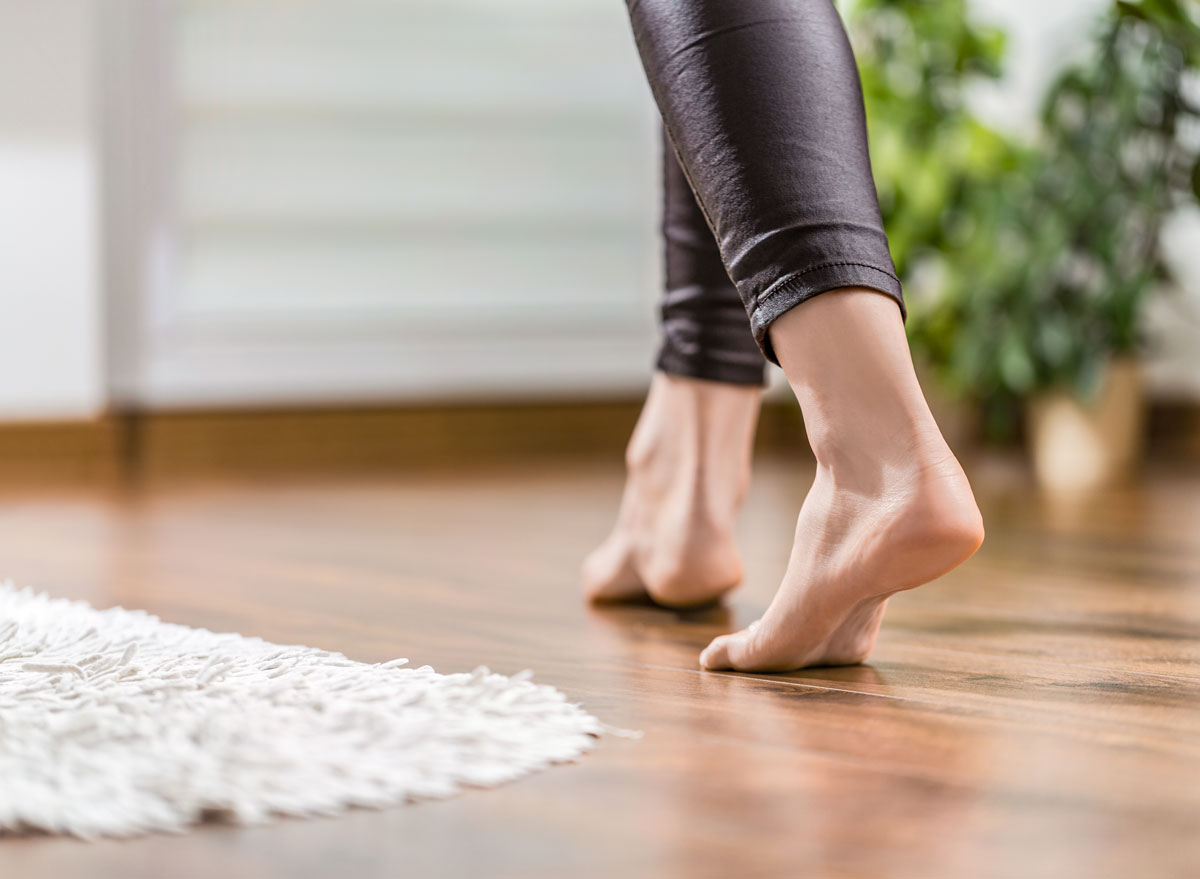Want to Live Longer? Do This One Simple Thing Every Day, Says Study

As we recently reported at ETNT Mind+Body, the long believed myth that you need to walk "10,000 steps per day for optimal health and longevity" was recently debunked by Harvard scientists in favor of a much more reasonable daily goal of 4,400 steps. Now, a new study just released by the American Heart Association (AHA) has offered even further clarity on how far you need to walk every day in order to live and longer and healthier life. The brand-new research was presented at the Epidemiology, Prevention, Lifestyle & Cardiometabolic Health Conference 2021. To learn one of the simplest ways you can strive to live longer every day, read on. And for more on the health benefits of walking, check out What Happens to Your Body When You Walk More, According to Science.
Any Steps Are Better Than No Steps, But Aim for At Least 4,500

As a general rule, the AHA recommends that you find time for at least 150 minutes of moderate physical activity (or 75 minutes if you perform vigorous exercise) every single week. But the new study sought to answer an important question: Does it matter if your daily steps all happen at once in an uninterrupted window of time, or is it just as healthy to break up your steps periodically throughout the day?
With that in mind, the researchers began tracking the daily walking habits and health outcomes of more than 16,000 older women (ages 60+) for the better part of a decade. When researchers separated those steps into "continuous" (defined as 10 minutes or more of uninterrupted walking) or "short spurts" (a trek up the stairs, for example), a number of noteworthy health effects became apparent.
In comparison to no daily steps at all, each initial increase of 1,000 daily steps of any kind was linked to a 28% decrease in death over the median six-year tracking period. In other words, walking more promotes a longer lifespan, regardless of whether you get in all your steps in one window or gradually over the course of the day.
Moreover, earlier research focusing on that same group of women found that those who achieved 4,500 steps per day (roughly the same findings as the aforementioned Harvard study) had a distinctly lower risk of death than inactive women. Importantly, that last finding even held up if a woman only walked in short spurts.
"Our current results indicate that this finding holds even for women who did not engage in any uninterrupted bouts of walking. Taking 2,000 or more additional steps during bouts was associated with further benefits for longevity," explains lead study author Christopher C. Moore, M.S., a Ph.D. student in epidemiology at the University of North Carolina at Chapel Hill. And for some great ways to get in more steps every day, don't miss these 4 Amazing Ways to Lose Weight While Walking for Just 20 Minutes, According to a Top Trainer.
The Benefits of Walking in "Short Spurts"

While this study concludes that walking more according to any schedule can help with longevity, some notable differences between "continuous versus interrupted" walking patterns emerged. Among the 16,732 women who took part in this project, 804 passed away between 2011 and 2019. Interestingly, women who walked more in short spurts tended to live longer, regardless of how often they went for long uninterrupted walks. Once again, the health benefits of short walking spurts appeared to level off after 4,500 steps.
It wasn't all bad for the continuous walkers in the study, however. Among women taking 2,000 uninterrupted steps daily, a 32% decrease in death was recorded.
Yes, Consider Investing in a Fitness Tracker

This work wouldn't have been possible without modern technology. Each participant wore a step counter for a period of four to seven days at some point between the years 2011 and 2015. Those trackers made it much easier for researchers to accurately gauge not only how much each woman was walking, but if their strolls were usually continuous or interrupted.
"Technological advances made in recent decades have allowed researchers to measure short spurts of activity. Whereas, in the past we were limited to only measuring activities people could recall on a questionnaire," Moore says. "With the help of wearable devices, more research is indicating that any type of movement is better than remaining sedentary."
If you're making it a goal to walk more, this observation underscores the importance of being able to accurately track your progress.
Exercise, Simplified

These findings are good news for anyone who hates carving out an hour for a jog or a trip to gym, and for older adults who may find that hitting their fitness goals isn't so easy any more. "Older adults face many barriers to participating in structured exercise programs, so some may find it more convenient and enjoyable to increase everyday walking behaviors, like parking slightly further from their destination or doing some extra housework or yard work," Moore concludes. And for some great ways to take your walking to a higher level, make sure you're aware of the The Secret Trick for Walking for Exercise, According to Health Experts at Harvard University.








